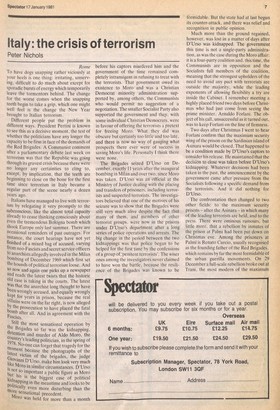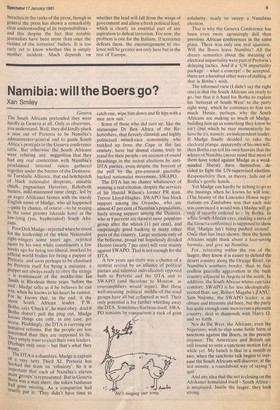Italy: the crisis of terrorism
Peter Nichols
Rome To have dogs snapping rather viciously at your heels is one thing: irritating, unnerving, difficult to do much about except for Sporadic bursts of energy which temporarily leave the tormentors behind. The change for the worse comes when the snapping teeth begin to take a grip, which one might well feel is the change the New Year brought to Italian terrorism.
Different people put the problem in different ways. President Pertini is known to see this as a decisive moment, the test of whether the politicians have any longer the capacity to be firm in face of the demands of the Red Brigades. A Communist comment after a parliamentary debate last week on terrorism was that the Republic was going through its gravest crisis because there were no longer any certainties to cling to, except, by implication, that the teeth are beginning to close on the bone for the first time since terrorism in Italy became a regular part of the scene nearly a dozen years ago.
Italians have managed to live with terrorism by relegating it very promptly to the subconscious, like the almost total capacity already to cease thinking consciously about even the tremendous Bologna bomb which Shook Europe only last summer. There are occasional reminders of past outrages. For instance, the court hearings have not yet finished of a mixed bag of accused, varying from neo-Fascists and secret service officers to anarchists allegedly involved in the Milan bombing of December 1969 which first set the hounds of political terrorism loose. And SO now and again one picks up a newspaper and reads the latest twists that the historic old case is taking in the courts. The latest was that the anarchist long thought to have been wrongly accused, and equally wrongly kePt for years in prison, because the real villains were on the far right, is now alleged bY the prosecution to have placed the fatal bomb after all. And in agreement with the FaSCiStS.
Still the most sensational operation by the Brigades so far was the kidnapping. detention and murder of Aldo Moro, the c.ountry's leading politician, in the spring of 1978. No-one can forget that tragedy for the rn. oment because the photographs of the latest victim of the brigades, the judge 11ceGr lovanni D'Urso, make him look very much . Moro in similar circumstances. D'Urso !s not so important a public figure as Moro but his is the biggest case of political kidnapping in the meantime and looks to be politically even more disturbing than the more sensational precedent. Moro was held for more than a month before his captors murdered him and the government of the time remained completely intransigent in refusing to treat with the terrorists. That government owed its existence to Moro ' and was a Christian Democrat minority administration supported by, among others, the Communists who would permit no suggestion of a negotiation. The smaller Socialist Party also supported the government and they, with some individual Christian Democrats, were in favour of offering the terrorists a pretext for freeing Moro. What they did was obscure but certainly too little and too late, and there is now no way of gauging what prospects there ever were of success in saving Moro'sfife. Personally I think there were none.
The Brigades seized D'Urso on December, exactly 11 years after the inaugural bombing in Milan and over two, since Moro was taken. D'Urso was an official at the Ministry of Justice dealing with the placing and transfers of prisoners, including terrorists and suspected terrorists. The investigators believed that one of the motives of his seizure was to show that the Brigades were still very much alive despite the fact that many of them, and members of other terrorist groups, were now in the prisons under D'Urso's department after a long series of police operations and arrests. The big change in the period between the two kidnappings was that police began to be helped for the first time by the confessions of a group ot'penitent terrorists'. The wiser ones among the investigators never claimed to have won the battle, because the resilience of the Brigades was known to be formidable. But the state had at last begun its counter-attack, and there was relief and recognition in public opinion.
Much more than the ground regained, however, was lost in a matter of days after D'Urso was kidnapped. The government this time is not a single-party administration, as was the case dtiring the Moro affair: it is a four-party coalition and. this time, the Communists are in opposition and the Socialists full members of the coalition, meaning that the strongest upholders of the need to avoid any pact with terrorists are outside the ,majority, while the leading exponents of allowing flexibility a try are inside the Cabinet. I remember meeting a highly placed friend two days before Christmas who had just come from seeing the prime minister, Arnaldo Forlani. The object of his call, unsuccessful as it turned out, . was to keep Forlani on the line of firmness.
Two days after Christmas I went to hear Forlani confirm that the maximum security wing of the prison on the Sardinian island of Asinara would be closed. That happened to be a condition made by D'Urso's captors to consider his release. He maintained that the decision to close was taken before D'Urso's kidnapping. Whatever decisions had been taken in the past, the announcement by the government came after 'pressure from the Socialists following a specific demand from the terrorists. And it did nothing for D'Urso.
• The confrontation then changed to two other fields: to the maximum security prisons — after the Asinara — in which many of the leading terrorists are held, and to the press. There were ominous rumours, but little more, that a rebellion by inmates of the prison at Palmi had been put down on Christmas eve. Among the prisoners at Palmi is Renato Curcio, usually recognised as the founding father of the Red Brigades, which remains by far the most formidable of the urban guerilla movements. On 29 December a full-scale rebellion broke out at Trani, the most modern of the maximum security prisons, and 19 hostages were taken by the terrorists. The government by this time was back to a position of firmness and sent to Trani a special squad of Carabinieri commandoes, functioning for the first time. They rapidly put an end to the revolt without bloodshed.
The response of the terrorists was twofold; they murdered a Carabinieri general in Rome, Enrico Galvaligi, who had worked with D'Urso, and at the same time demanded that documents prepared by the Palmi and Trani prisoners should be given prominent coverage by the newspapers and television. In fact, despite the theoretical description of these prisons as centres where maximum security reigns, the prisoners had no difficulty in making their views known, including the question of whether D'Urso should be freed. A group of Radical Party parliamentarians made a series of visits to them not only to collect their documents but also to hear their allegations of having been beaten up after the rebellion.
The prisoners had the means to keep themselves fully informed of what their fellow-terrorists were doing in Rome. Stories began to emerge suggesting that conditions in these special prisons had little to do with maximum security. The condemned terrorists were said to be able to demand conditions which suited them, not only because they were well organised as a group but because they could threaten reprisals outside the prison against difficult guards. They were now insisting that their ideas be published throughout the whole national press.
Newspaper editors were now placed in an unenviable position. There is little or no tradition of self-discipline in the Italian press. During the Moro kidnapping, no attempt was made to keep reporting strictly to events.
A reminder of these practices came on 1 January when a journalist working for the weekly L'Espresso was arrested for having allegedly made contact with representatives of the Red Brigades who answered his questions and gave him a copy of the interrogation of D'Urso. He had not informed the authorities. Three days later, a second journalist of L'Espresso was arrested. The response from a broad section of the press was nevertheless impressive. Most of the leading newspapers bound themselves not to publish the documents of the terrorists. But the whole front did not hold. The 9th of January brought two events of political importance: Adolfo Sarti, the Minister of Justice, told Parliament that the government would 'never' negotiate with the Brigades. At the same time, the official newspaper of the Socialist Party, Avanti , published sections of the Trani documents.
The strain on the coalition was severe. The small but highly respected Republican Party had already made known that it would abandon the coalition — and so bring down the government — unless the firm line was maintained. The Communists have kept up a constant criticism of alleged governmental weakness and confusion. The coalition remained intact, but the divisions were there.
And the government's own general performance suffered from these internal difficulties: it had, in the words of a high official closely following events, 'wings of lead', not, certainly, the proper equipment with which to outdistance the hounds of violence.
The facts speak largely for themselves but there is room for two comments, perhaps. The terrorists have never before managed to make their presence felt directly on a government as they have this time with the kidnapping of a man who was not well known or particularly important. Secondly, they have shown this time a much clearer strategy, much less hedged with interminable ideological statements which accompanied the holding of Moro. Their intention is to break the system of prisons in which their colleagues are held and to obtain the maximum publicity. They have coldly and ably followed these two aims, while incidentally letting it be known that they propose a civil war as a prelude to the left-wing revolution which they maintain is their principal objective.
They have partly succeeded in both their aims. Asinara, Palmi and Trani cannot be looked on now as centres specifically designed to cut off condemned terrorists from the rest of society. There have been breaches in the ranks of the press, though in general the press has shown a remarkably clear understanding of its responsibilities and this despite the fact that notable journalists have been more than once the victims of the terrorists' bullets. It is too early yet to know whether this is simply another incident. Much depends on whether the lead will fall from the wings of government and allow a fresh political lead, which is clearly an essential part of any aspiration to defeat terrorism. For now, the problem is one for the Italians. If terrorism defeats them, the encouragement to violence will be greater not only here but in the rest of Europe.




































 Previous page
Previous page